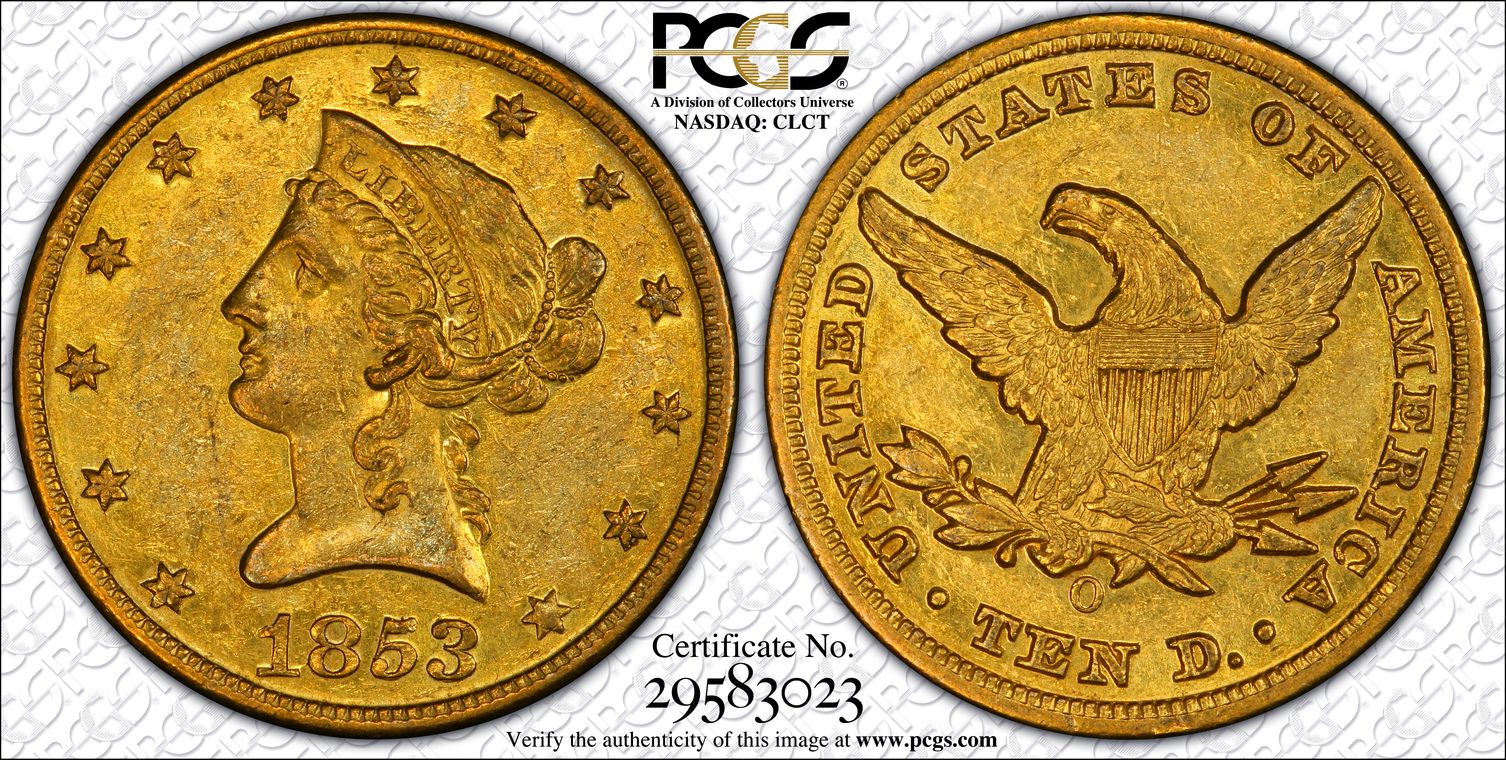1853-O $10 AU58 认证号29583023, PCGS号8612
专家评论
David Akers (1975/88)
The 1853-O is a rare date in all grades and extremely rare in strictly uncirculated condition. Most specimens are well worn with VF and EF being the grades one is most likely to find. The "proof" listing from "Auction '79" is for the same coin that appeared in Lester Merkin's 3/69 sale where it was called a gem uncirculated, prooflike presentation piece. As a date, the 1853-O is one of the more "common" O-Mint No Motto Eagles although it is more rare than the 1843-O, 1847-O, 1851-O and 1854-O. From the standpoint of overall rarity, it is comparable to the 1842-O, 1844-O and 1858-O.
Doug Winter
The 1853-O is the third most available New Orleans eagle of this type, trailing the 1851-O and 1847-O. It is fairly easy to find in the lower AU grades but for some unknown reason, it is excessively rare in Uncirculated with just two or so currently known.The 1853-O is one of the more common New Orleans eagles from the 1850s. It is easy to locate in VF and EF and is moderately scarce in the lower AU grades. However, it is very scarce and undervalued in the higher AU grades. It is exceedingly rare in Uncirculated, with just two or three currently known.
STRIKE: The strike resembles that seen on the 1852-O eagle. The central obverse is mostly well detailed with weakness sometimes seen on the curls around the face and behind the ear. The stars are typically flat although those on the right side sometimes show some detail on the radial lines while the ones on the left do not. The reverse is well struck with good detail on the eagle’s feathers The arrow feathers are sometimes weak.
SURFACES: The surfaces are below average with most examples possessing deep abrasions in the field, which impair the luster. I have seen some with small mint made planchet chips in the fields. It is extremely hard to locate an 1853-O eagle with choice surfaces.
LUSTER: The luster is of average quality. The texture seen on many higher grade pieces is frosty. There are some reflective Prooflike examples known, including one that is so reflective that it has been called a “Branch Mint Proof” on prior occasions. The typical 1853-O shows enough scuffmarks that the luster is impaired.
COLORATION: The natural coloration ranges from a deep green-gold to a rich orange-gold shade. There were a number of lower grade (VF to EF) circulated pieces that were found in Europe in the first part of the 1990s and these are often characterized by very deep color with an almost black appearance on the high spots.
EYE APPEAL: This is not an easy date to find with good eye appeal. The typical 1853-O eagle is fairly well struck and may have some luster, but it is usually seen with numerous abrasions that limit the eye appeal. This is typically regarded as a common date but properly graded AU55 and better examples with good eye appeal are much harder to find than generally believed.
DIE CHARACTERISTICS: There is die lapping on the obverse at the curls on the back of Liberty’s head. This makes the curls partially detached from the neck. On the reverse there are a number of light die scratches above TE in STATES.
MAJOR VARIETIES: There are at least four varieties known:
Variety One: The date is large and placed low in the field with both the 1 and the 3 distant from the bust. Early die states show light repunching on the base of the 53 in the date. Late states show cracks at stars one and two, a heavy crack from the rim to star thirteen and another from the final star to the bust. Reverse of 1851-52 with a hollow ring on the shield. The mintmark is high in the field and close to the arrow feather. It is placed over the EN in TEN. Breen-6908. The most common variety of the year. Breen’s variety “6907” is an early die state.
Variety Two: The date is placed similarly to the position seen on Variety One. The 1 in the date is noticeably doubled at its base. Same reverse as last. Unlisted in Breen. Very scarce.
Variety Three: There are bold, raised die finishing marks coming from the date numerals including a burst of rays extending to the left from the center of the 3. Most of the stars have short die lines that come from the points out into the fields. This is especially noticeable at the southwest point of the thirteenth star. Same reverse as last. Heritage 1999 ANA: 8101 and Bass II:1423 are the only examples seen. Unlisted in Breen. Extremely rare
Variety Four: Same obverse as on Variety One. On late states, a crack connects the final two stars. The reverse does not show a hollow ring. The mintmark is placed lower in the field than on the other reverse used this year, and is positioned further to the left, more over the E in TEN. Breen-6906. Much scarcer than Variety One.
PCGS #
8612
设计师
Christian Gobrecht
边缘
Reeded
直径
26.80 毫米
重量
16.70 克
铸币数量
51000
金属成分
90% Gold, 10% Copper
更高评级数量
8
评级较低的钱币数量
231
地区
The United States of America
价格指南
PCGS 数量报告
拍卖 - PCGS 评级的
拍卖 - NGC 评级的
稀有性和存量估计 了解更多
| 所有评级 | 287 |
| 60或以上 | 3 |
| 65或以上 | 0 |
| 所有评级 | R-6.4 |
| 60或以上 | R-9.8 |
| 65或以上 | R-10.1 |
| 所有评级 | 51 / 64 TIE |
| 60或以上 | 13 / 64 TIE |
| 65或以上 | 1 / 64 |
| 所有评级 | 93 / 183 TIE |
| 60或以上 | 30 / 183 TIE |
| 65或以上 | 1 / 183 |





















